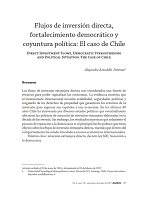Direct Investment Flows, Democratic Strengthening and Political Situation: The Case of Chile
DOI:
https://doi.org/10.32870/mycp.v6i18.555Keywords:
Foreign Direct Investment, Decree Law 600, Transition to Democracy.Abstract
Direct investment flows are considered one of the funding sources to capitalize the economy. The evidence shows how foreign investors need stability, political security and maintenance of property rights which guarantee the return of investment to register their capital to an economic process. During the last 40 years Chile has been facing different political stages which eventually affected the political attraction of foreign investment developed in the seventies. Nevertheless, results show that only the transition to a democratic process is the main political fact having effects on the Direct Foreign Investment flows, while the rest of the performance is associated to foreign economical events.Downloads
References
Appleyard, D., y Field, A. (2003). Economía internacional. (4a edición). Bogotá, Colombia: McGraw-Hill.
Astudillo, A. (2014). Apertura comercial, estabilidad política y crecimiento empobrecido: Evidencia para Chile. Tesis de Maestría. Universidad de Santiago de Chile.
Astudillo, A., y Guerrero, D. (2016). Especialización económica y crecimiento empobrecido: Evidencia para Chile. Trilogía, 28(39): 96-112. Disponible en http://trilogia.blogutem.cl/files/2016/09/trilogia-utem-facultadadministracion-economia-vol28-39-2015.pdf
Bai, J., y Perrón, P. (1998). Estimating and Testing Linear Models with Multiple Structural Changes. Econométrica, 66(1): 47-78.
Bengoa, M., y Sánchez-Robles, B. (2003). Foreign direct investment, economic freedom and growth: New evidence from Latin America. European Journal of Political Economy, 19(3): 529-545. doi: 10.1016/S0176-2680(03)00011-9
Bhagwati, J. (1958). Immiserizing Growth: A Geometrical Note. The Review of Economic Studies, 25(3): 201-205.
——. (1968). Distortions and Immiserizing Growth: A Generalization. The Review of Economic Studies, 35(4): 481-485.
Büchi, H. (1993). Transformación económica de Chile. Del estatismo a la libertad económica. Bogotá, Colombia: Norma.
Comité de Inversiones Extranjeras. (2015). Base de datos estadísticos de inversión extranjera directa amparada en el dl 600. Recuperado de http://www.ciechile.gob.cl/ Consulta 21 de julio de 2015.
Damooei, J., y Tavakoli, A. (2006). The Effects of Foreign Direct Investment and Import on Economic Growth: A Comparative Analysis of Thailand and the Philippines. The Journal of Developing Areas, 39(2): 79-100. doi 10.1353/jda.2006.0002
Jensen, C. (2006). Foreign Direct Investment and Economic Transition: Panacea or Pain Killer? Europe-Asia Studies, 58(6): 881-902. doi 10.1080/09668130600831084
Krugman, P., y Obstfeld, M. (2001). Economía internacional: Teoría y política. (5a edición). Madrid: Pearson Educación.
Larrain, F., y Vergara, R. (Eds). (2001). La transformación económica de Chile. Santiago de Chile: Centro de Estudios Públicos.
Mazumdar, T. (2005). Capital Flow into India: Implications for Its Economic Growth. Economic and Political Weekly, 40(21): 2183-2189. doi: 10.2307/4416675
Prasad, E., Rajan, R., y Subramanian, A. (2007). Foreign Capital and Economic Growth. Brookings Papers on Economic Activity, núm. 1, pp. 153-209.
Ram, R., y Honglin, K. (2002). Foreign Direct Investment and Economic Growth: Evidence from Cross-Country Data for the 1990s. Economic Development and Cultural Change, 51(1): 205-215. doi: 10.1086/345453
Tuman, J., y Emmert, C. (1999). Explaining Japanese direct investment in Latin America, 1979-1992. Social Science Quarterly, 80(3): 539-555.
Yao, S., y Wei, K. (2007). Economic Growth in the Presence of fdi: The Perspective of Newly Industrializing Economies. Journal of Comparative Economics, 35(1): 211-234. doi: 10.1016/j.jce.2006.10.007
Yi, F. (1997). Democracy, Political Stability and Economic Growth. British Journal of Political Science, 27(3): 391-418.

Downloads
Published
How to Cite
Issue
Section
License
Open Access Policy
This journal provides open access to all its contents, in adherence to the principle that making research freely available supports a greater global exchange of knowledge.
MyCP is licensed under a Creative Commons Attribution-NonCommercial license, also known as CC BY-NC.
Contents are published in both PDF and XML formats.
Authors who publish in México y la Cuenca del Pacífico must accept the following conditions:
Pursuant to Mexican copyright laws, México y la Cuenca del Pacífico acknowledges and respects the authors’ moral right and ownership of property rights, which will be assigned to the University of Guadalajara to publish the articles in an open-access mode.
México y la Cuenca del Pacífico does not charge the authors any fees for receiving and processing their articles.
Authors are permitted to enter into other independent and additional contractual agreements for the non-exclusive distribution of the article version published in México y la Cuenca del Pacífico (for example, publishing it in an institutional repository or in other printed or electronic media) as long as they clearly state that the piece was originally published in México y la Cuenca del Pacífico.
Pursuant to the above, once the article is approved for publication, authors must send the Assignment of Rights Agreement form duly filled and signed. This form must be sent to mexicoylacuenca@gmail.com as a PDF file.
Readers/users of México y la Cuenca del Pacífico can freely access the journal new issues as soon as they are uploaded. Readers/users are allowed to cite, share (both electronically and physically), print and distribute the material, provided they expressly state that the work was originally published in México y la Cuenca del Pacífico. Contents are to be properly cited and never for commercial purposes.




